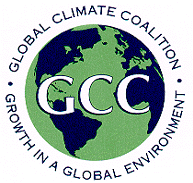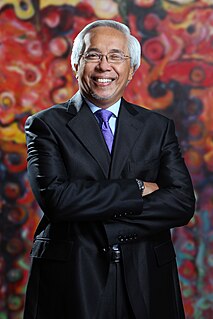
The Global Climate Coalition (GCC) (1989–2001) was an international lobbyist group of businesses that opposed action to reduce greenhouse gas emissions and publicly challenged the science behind global warming. The GCC was the largest industry group active in climate policy and the most prominent industry advocate in international climate negotiations. The GCC was involved in opposition to the Kyoto Protocol, and played a role in blocking ratification by the United States. The coalition knew it could not deny the scientific consensus, but sought to sow doubt over the scientific consensus on climate change and create manufactured controversy. The GCC dissolved in 2001 after membership declined in the face of improved understanding of the role of greenhouse gases in climate change and of public criticism.

The global warming controversy concerns the public debate over whether global warming is occurring, how much has occurred in modern times, what has caused it, what its effects will be, whether any action should be taken to curb it, and if so what that action should be. In the scientific literature, there is a strong consensus that global surface temperatures have increased in recent decades and that the trend is caused by human-induced emissions of greenhouse gases. No scientific body of national or international standing disagrees with this view, though a few organizations with members in extractive industries hold non-committal positions.

The Montreal Protocol on Substances that Deplete the Ozone Layer is an international treaty designed to protect the ozone layer by phasing out the production of numerous substances that are responsible for ozone depletion. It was agreed on 16 September 1987, and entered into force on 16 September 1989, following a first meeting in Helsinki, May 1989. Since then, it has undergone eight revisions, in 1990 (London), 1991 (Nairobi), 1992 (Copenhagen), 1993 (Bangkok), 1995 (Vienna), 1997 (Montreal), 1998 (Australia), 1999 (Beijing) and 2016 (Kigali) As a result of the international agreement, the ozone hole in Antarctica is slowly recovering. Climate projections indicate that the ozone layer will return to 1980 levels between 2050 and 2070. Due to its widespread adoption and implementation it has been hailed as an example of exceptional international co-operation, with Kofi Annan quoted as saying that "perhaps the single most successful international agreement to date has been the Montreal Protocol". In comparison, effective burden sharing and solution proposals mitigating regional conflicts of interest have been among the success factors for the ozone depletion challenge, where global regulation based on the Kyoto Protocol has failed to do so. In this case of the ozone depletion challenge, there was global regulation already being installed before a scientific consensus was established. Also, overall public opinion was convinced of possible imminent risks.

The United Nations Environment Programme (UNEP), an agency of the United Nations, coordinates the organization's environmental activities and assists developing countries in implementing environmentally sound policies and practices. It was founded by Maurice Strong, its first director, as a result of the United Nations Conference on the Human Environment in June 1972 and has overall responsibility for environmental problems among United Nations agencies; however, international talks on specialized issues, such as addressing climate change or combating desertification, are overseen by other UN organizations, like the Bonn-based Secretariat of the United Nations Framework Convention on Climate Change and the United Nations Convention to Combat Desertification. UNEP's activities cover a wide range of issues regarding the atmosphere, marine and terrestrial ecosystems, environmental governance and green economy. It has played a significant role in developing international environmental conventions, promoting environmental science and information and illustrating the way those can be implemented in conjunction with policy, working on the development and implementation of policy with national governments, regional institutions in conjunction with environmental non-governmental organizations (NGOs). UNEP has also been active in funding and implementing environment related development projects.
The Summary for policymakers (SPM) is a summary of the Intergovernmental Panel on Climate Change (IPCC) reports intended to aid policymakers. The form is approved line by line by governments: "Negotiations occur over wording to ensure accuracy, balance, clarity of message, and relevance to understanding and policy."
Drew Shindell is a physicist and a climate specialist and professor at Duke University's Nicholas School of the Environment. His H-index is 94 and he is listed as an ISI Highly Cited Researcher. He was a chapter lead of the Intergovernmental Panel on Climate Change (IPCC) October 8, 2018 Special Report on Global Warming of 1.5ºC as well as on the Intergovernmental Panel on Climate Change's Fifth Assessment Report in 2013. He has testified on climate issues before both houses of the US Congress, at the request of both parties. His research concerns natural and human drivers of climate change, linkages between air quality and climate change, and the interface between climate change science and policy. He has been an author on more than 200 peer-reviewed publications and received awards from Scientific American, NASA, the EPA, and the NSF.
The IPCC Third Assessment Report (TAR), Climate Change 2001, is an assessment of available scientific and socio-economic information on climate change by the IPCC. The IPCC was established in 1988 by the United Nations Environment Programme (UNEP) and the UN's World Meteorological Organization (WMO) "... to assess scientific, technical and socio-economic information relevant for the understanding of climate change, its potential impacts and options for adaptation and mitigation." The Third Assessment Report is the third of a series of assessments; it has been superseded by the IPCC Fourth Assessment Report (AR4), released in 2007.
The Second Assessment Report (SAR) of the Intergovernmental Panel on Climate Change (IPCC), published in 1996, is an assessment of the then available scientific and socio-economic information on climate change. It was superseded by the Third Assessment Report (TAR) in 2001.
Philip A. Cooney is a former member of the administration of United States President George W. Bush. Before being appointed to chair the Council on Environmental Quality, he was a lawyer and lobbyist for the American Petroleum Institute.
A global warming conspiracy theory invokes claims that the scientific consensus on global warming is based on conspiracies to produce manipulated data or suppress dissent. It is one of a number of tactics used in climate change denial to legitimize political and public controversy disputing this consensus. Global warming conspiracy theorists typically allege that, through worldwide acts of professional and criminal misconduct, the science behind global warming has been invented or distorted for ideological or financial reasons, or both.
Yuri Antonovich Izrael was a vice-chairman of the Intergovernmental Panel on Climate Change (IPCC) until September 2008, when the new bureau was elected. He was the "most influential scientific adviser" for Vladimir Putin, the president of Russia, according to CNN.
The Fifth Assessment Report (AR5) of the United Nations Intergovernmental Panel on Climate Change (IPCC) is the fifth in a series of such reports. The IPCC was established in 1988 by the World Meteorological Organization (WMO) and the United Nations Environment Programme (UNEP) to assess scientific, technical and socio-economic information concerning climate change, its potential effects and options for adaptation and mitigation.

Tan Sri Zakri bin Abdul Hamid has had a distinguished career in science as a researcher, educator, administrator and diplomat.
Stephen Oliver Andersen is the American Director of Research at the Institute for Governance and Sustainable Development (IGSD) and former Co-Chair of the Montreal Protocol Technology and Economic Assessment Panel (TEAP). He is considered one of the founders and leading figures in the success of the Montreal Protocol that has phased out the chemicals that deplete the stratospheric ozone that protects the Earth against the harmful effects of ultraviolet radiation that causes skin cancer, cataracts, and suppression of the human immune system, and destroys agricultural crops and natural ecosystems. Because ozone-depleting chemicals are also powerful greenhouse gases the Montreal Protocol also protected climate.
Dr Julie Michelle Arblaster is an Australian scientist. She is currently an Associate Professor in the School of Earth, Atmosphere and Environment at Monash University. Arblaster was a lead author on the Intergovernmental Panel on Climate Change Working Group I contribution to the Fifth Assessment Report.
Ozone depletion and climate change, or Ozone hole and global warming in more popular terms, are environmental challenges whose connections have been explored and which have been compared and contrasted, for example in terms of global regulation, in various studies and books.

Hoesung Lee is a South Korean economist and current chair of the Intergovernmental Panel on Climate Change. He is professor in the economics of climate change, energy and sustainable development in the Graduate School of Energy, Environment, Policy & Technology at Korea University in the Republic of Korea. Lee received his B.A. in economics from Seoul National University and a Ph.D. in economics from Rutgers University. Lee began his career as an economist working for ExxonMobil. Lee was elected as the chair of the Intergovernmental Panel on Climate Change (IPCC) on October 6, 2015. One of his elder brothers is Lee Hoi-chang, former Prime Minister of South Korea and three-time presidential candidate.
The ExxonMobil climate change controversy concerns ExxonMobil's activities related to climate change, especially their views on climate change skepticism. Since the 1970s, ExxonMobil engaged in climate research, and later begun lobbying, advertising, and grant making, some of which were conducted with the purpose of delaying widespread acceptance and action on global warming.

















